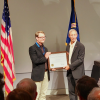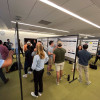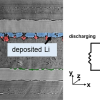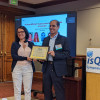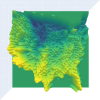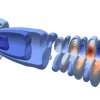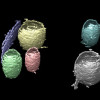News Center
Berkeley Lab Collaborations Help Illuminate Earth's Biodiversity
Researchers in Berkeley Lab’s Applied Mathematics and Computational Research Division and at the Joint Genome Institute, with the help of supercomputers at the National Energy Research Scientific Computing Center and support from the Department of Energy’s Exabiome Exascale Computing Project, have developed new tools to advance the field of metagenomics and expand scientists’ understanding of our world’s biodiversity. Read More »
Berkeley Lab to Partner with Jefferson Lab to Build $300+ Million High Performance Data Facility Hub
The U.S. Department of Energy has announced the selection of Thomas Jefferson National Accelerator Facility (Jefferson Lab) as the lead for its new High Performance Data Facility Hub. Jefferson Lab will partner with Lawrence Berkeley National Laboratory (Berkeley Lab) to form a joint project team led by Jefferson Lab. Read More »
2023 Egon Balas Prize Awarded to Berkeley Lab’s Stefan Wild
AMCR Director Stefan Wild was awarded the INFORMS Optimization Society’s 2023 Egon Balas Prize for his fundamental contributions to derivative-free optimization. Read More »
Berkeley Lab Computing Sciences Research Staff Honored with Seven Director’s Awards for Exceptional Achievement
Six Director’s Awards for Exceptional Achievement will be awarded to Berkeley Lab Computing Sciences staff at an awards ceremony held on Wednesday, November 8. The Director’s Awards program recognizes the significant achievements of Lab employees. Read More »
Engaging Neuroscience Community Remains Top of Mind for Neurodata Without Borders Team
As adoption of the NWB standard and ecosystem grow, training and data sharing opportunities for the neuroscience community broaden worldwide. Read More »
Ana Kupresanin Tapped to Lead Berkeley Lab's Scientific Data Division
Ana Kupresanin has been selected to serve as the next division director for Lawrence Berkeley National Laboratory’s Scientific Data Division in the Computing Sciences Area. Her appointment will be effective October 9, 2023. Read More »
Epidemiological Modeling in the Exascale Era
With funding from DOE’ss BRaVE initiative, the Berkeley Lab-led EMERGE project will expand the capabilities of ExaEpi, an exascale-ready epidemiological agent-based model to target six diseases. Read More »
Data Processing Pipeline Transforms Planck Mission Discovery
Reijo Keskitalo, a member of SciData’s Computational Cosmology Center, was awarded NASA’s Exceptional Public Achievement Medal for “developing novel tools and approaches for maximizing NASA’s understanding of the universe from the Planck mission data.” Read More »
SULI Program Helps Computing Sciences Area Summer Interns Break New Ground
The DOE SULI program is designed to encourage undergraduate students from two- and four-year colleges, post-baccalaureates, and graduate students to pursue STEM careers by providing research internships at DOE national laboratories. Read More »
“Debfest,” Celebrating Deb Agarwal’s Contributions to Science and Berkeley Lab Culture
On Friday, July 7, former Scientific Data Division Director Deb Agarwal’s family, friends, and colleagues gathered at UC Berkeley’s Faculty Club to celebrate her 29-year career and contributions to Berkeley Lab Computing Sciences area—an event jokingly dubbed “Debfest.” Read More »
Using Deep Learning to Better Assess Lithium Metal Battery Performance
A team of researchers from CAMERA, Berkeley Lab, UC Irvine, and Argonne have developed batteryNET, a deep learning algorithm that enhances the assessment of lithium agglomeration in solid-state lithium metal batteries. Read More »
Peter Schwartz Retires from Berkeley Lab after 22 Years in Computing Sciences
For Peter Schwartz, a research scientist who joined the Computing Sciences Area’s Applied Numerical Algorithms Group in 2001, math has long been a pathway. Now, after 20+ years at Berkeley Lab, Schwartz is moving on to his next adventure. Read More »
Craig Leres to Retire after 40+ Years with Berkeley Lab
Craig Leres, a hardware, operating systems, and networking engineer in the Berkeley Lab Computing Sciences Area’s Scientific Data Division and the Lab’s Cyber Security Group, is retiring this July after 40-plus years at the Lab. Read More »
A Data Science Pioneer, Deb Agarwal Retires From Berkeley Lab
After a distinguished Berkeley Lab career spanning nearly three decades, Scientific Data Division (SciData) Director Deborah Agarwal retired on July 1. Deb has played a pivotal role in using computer and data science to address the needs of diverse scientific communities and laid a strong foundation for Berkeley Lab to lead in the field of data science. Read More »
Berkeley Lab Celebrates 20 Years of the Alvarez Fellowship
This year, Lawrence Berkeley National Laboratory (Berkeley Lab) is celebrating yet another milestone: the 20th anniversary of the Luis W. Alvarez Fellowship in Computing Sciences. Read More »
Berkeley Lab Computing Sciences Takes Novel Approach to Science Workforce Development and Diversity
The Sustainable Research Pathways (SRP) program has been connecting students from underrepresented communities and institutions to scientists and staff at Berkeley Lab for nearly a decade to facilitate research collaborations and bolster workforce development and diversity, equity, and inclusion. Read More »
Berkeley Lab’s Novel Method for Modeling Fluids at the Mesoscale
Recently, Berkeley Lab researchers developed a continuum FHD model that efficiently harnesses the power of cutting-edge exascale supercomputers to simulate the transport phenomenai n fluid mixtures. Read More »
Quantum-Inspired Artwork Unveiled
For World Quantum Day on April 14, Berkeley Lab’s Computing Sciences Area celebrated the interdisciplinary collaboration between the Advanced Quantum Testbed (AQT) at Berkeley Lab and the California-based contemporary visual artist Benjamin Arizmendi. Read More »
Quantum Evolution
A leading expert in quantum computing, Bert de Jong discusses why quantum computing matters, where it is today, and the potential of this emerging technology to change science. Read More »
Berkeley Lab Researchers Awarded ISQED’23 Best Paper
The International Symposium on Quality Electronic Design (ISQED’23) recognized researchers in Lawrence Berkeley National Laboratory’s (Berkeley Lab’s) Computer Architecture Group with a Best Paper Award for “An Area Efficient Superconducting Unary CNN Accelerator.” Read More »
New Math Methods and Perlmutter HPC Combine to Deliver Record-Breaking ML Algorithm
Using the Perlmutter supercomputer at the National Energy Research Scientific Computing Center (NERSC), researchers at Lawrence Berkeley National Laboratory (Berkeley Lab) have devised a new mathematical method for analyzing extremely large datasets – and, in the process, demonstrated proof of principle on a record-breaking dataset of more than five million points. Read More »
Improving Training for Scientific Machine Learning
In the world of scientific machine learning (SciML), scientists are beginning to embrace the use of neural networks as a way to accelerate simulations. At the heart of deep learning algorithms, neural networks provide a mechanism to encode complex dependency structures, using many connected node layers to transform data into learned features to be used for a wide range of scientific tasks. Read More »
The Most Advanced Bay Area Earthquake Simulations Will be Publicly Available
A collaboration involving scientists and computing resources from Berkeley Lab and the simulation software EQSIM is releasing the most accurate and detailed earthquake simulations to date, which will initially capture earthquake motions across the San Francisco Bay Area and later expand to other regions. Read More »
WarpX Code Shines at the Exascale Level
The WarpX project has spent the last six years creating a novel, highly parallel, and highly optimized single-source simulation code for modeling plasma-based particle colliders on cutting-edge exascale supercomputers, with broad importance for other accelerators and related problems. Read More »
Berkeley Lab Scientists Create Machine Learning Pipeline for Interpreting Large Tomography Datasets
A group of Berkeley Lab scientists has developed and tested several machine learning techniques organized in a learning pipeline to improve the interpretation of increasingly large cryo-ET datasets. Read More »
















